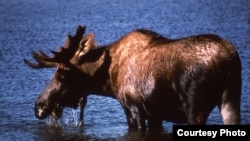Moose drool has been proven an unlikely weapon in the daily fight for survival, according to new research.
The study, published in Biology Letters, is the first to show that an animal can ‘fight back’ against a plant defense, while providing a glimpse of the back and forth strategy of survival.
Plants have defenses, such as thorns or bitter taste, to deter predators and ensure growth. "We know that animals can remember if certain plants have made them feel ill, and they may avoid these plants in the future," said York University biology professor Dawn Bazely.
One species of grass defends itself by harboring a toxic fungus that fends off hungry animals. But moose can graze on the grass with no ill effect.
Bazely and her colleagues wondered why. Following up on a study which found that moose grazing had a positive effect on plant growth, they applied samples of moose saliva to grass containing the poisonous fungus. Within 12 to 36 hours, the grass was “detoxified”.
She added that repeated exposure of the moose saliva reduced toxins in the grass by 41 to 70 percent. That may make preferred grazing areas even more hospitable for the moose.




